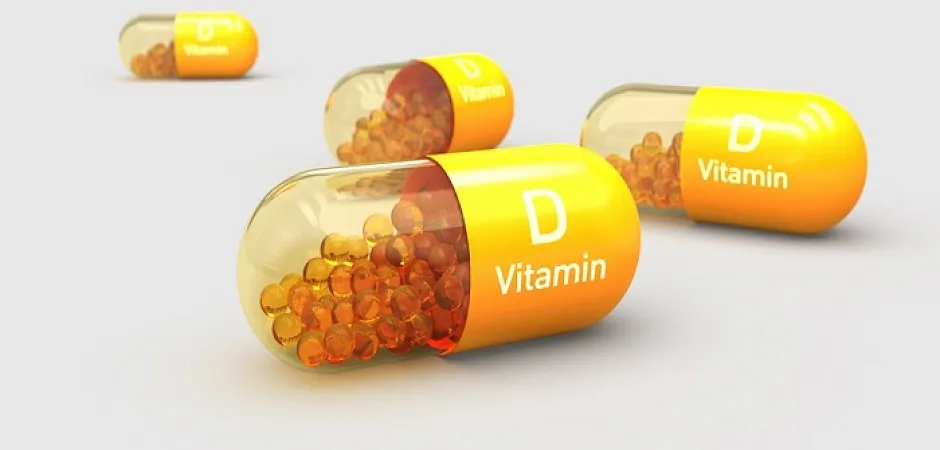Many people take vitamin D supplements to support their bone health and immune system, but new research reveals an unexpected interaction between the two main forms of this essential vitamin. A recent study analyzing data from over 650 adults found that taking vitamin D2 supplements may actually decrease the body’s levels of vitamin D3 by approximately 18 nanomoles per liter.
Vitamin D2 supplements can lower blood levels of vitamin D3, the form that the body uses more effectively for various health functions. This discovery challenges common assumptions about vitamin D supplementation and raises important questions about which form people should choose. The finding is particularly significant for individuals following plant-based diets, who often rely on vitamin D2 supplements since vitamin D3 typically comes from animal sources.
Understanding this interaction between vitamin D2 and D3 is crucial for making informed decisions about supplementation. The research explores the mechanisms behind this reduction, examines the health implications, and provides guidance on selecting the most appropriate vitamin D supplement based on individual dietary preferences and health needs.
How Vitamin D2 Supplements May Reduce Vitamin D3 in Your Body
Recent systematic reviews have identified a significant reduction in 25-hydroxyvitamin D3 levels when individuals take vitamin D2 supplements. This effect appears consistent across multiple studies and suggests competitive metabolic pathways between the two vitamin D forms.
Evidence From Recent Systematic Review and Meta-Analysis
A comprehensive meta-analysis of randomized controlled trials examined 11 studies involving 655 adults to assess the effect of vitamin D2 supplementation on vitamin D3 status. The systematic review and meta-analysis revealed that participants taking vitamin D2 supplements consistently showed lower vitamin D3 levels compared to control groups.
The analysis demonstrated that vitamin D2 supplements may reduce circulating 25-hydroxyvitamin D3 concentrations by measurable amounts. This finding emerged from studies with varying dosages and durations, suggesting the effect occurs across different supplementation protocols.
Researchers found this reduction occurred regardless of baseline vitamin D status. The meta-analysis of randomized controlled trials included participants from different geographic locations and seasons, strengthening the evidence for this metabolic interaction.
The systematic review revealed that the effect of vitamin D2 supplementation on D3 status was previously unrecognized in clinical practice. This discovery challenges assumptions about vitamin D form interchangeability in supplementation strategies.
Comparison With Placebo and Control Groups
Studies comparing vitamin D2 supplementation groups with placebo controls showed distinct patterns in circulating vitamin D metabolites. Participants receiving vitamin D2 supplements demonstrated significantly lower vitamin d3 concentrations than those receiving placebo or no supplementation.
Control groups maintained stable 25-hydroxyvitamin D3 levels throughout study periods. In contrast, vitamin d2 supplement users experienced progressive declines in their natural D3 concentrations over time.
The magnitude of D3 reduction varied between studies but remained consistent in direction. Placebo groups showed no significant changes in either vitamin D2 or D3 levels, confirming that the observed effect of vitamin D2 was specific to the supplementation intervention.
Some trials included vitamin D3 supplementation arms, which showed opposite effects. These groups maintained or increased their D3 status while showing minimal impact on D2 levels.
Potential Biological Mechanisms Behind the Reduction
The effect of vitamin d2 supplementation on D3 levels likely involves competitive inhibition at key enzymatic steps in vitamin D metabolism. Both forms compete for the same binding proteins and metabolic enzymes in the liver and kidneys.
Vitamin D2 and D3 share common pathways for hydroxylation reactions that produce their active metabolites. When vitamin D2 concentrations increase through supplementation, these molecules may preferentially occupy enzyme binding sites, reducing D3 processing efficiency.
The vitamin D-binding protein shows different affinities for D2 and D3 metabolites. This difference in binding strength could affect transport and tissue distribution of 25-hydroxyvitamin d3, potentially explaining the observed reductions.
Competitive metabolism may also occur at the 1α-hydroxylase enzyme level in kidneys. This enzyme converts both 25-hydroxyvitamin D2 and D3 to their active forms, but may process them at different rates, affecting overall D3 status in supplemented individuals.
Understanding the Different Forms of Vitamin D
Vitamin D exists in two primary supplemental forms with distinct sources and biological effects. D2 comes from plant sources while D3 originates from animal products and sunlight exposure, with research showing significant differences in how effectively each form raises vitamin D levels in the body.
Vitamin D2 Versus Vitamin D3: Sources and Absorption
Vitamin D2 (ergocalciferol) comes from plant sources and yeast. Manufacturers typically produce D2 supplements from UV-irradiated mushrooms or yeast.
Vitamin D3 (cholecalciferol) occurs naturally when skin produces it from sunlight exposure. Animal sources like fish, egg yolks, and liver also contain D3.
The body absorbs these forms differently. D3 shows superior absorption and effectiveness compared to D2 for raising total vitamin D levels.
Research indicates D3 supplements maintain blood vitamin D concentrations more effectively than D2. The liver converts both forms to 25-hydroxyvitamin D, but D3 conversion occurs more efficiently.
Key absorption differences:
- D3 has longer half-life in blood
- D3 binds more effectively to vitamin D binding proteins
- D3 shows better bioavailability in most individuals
Recent studies reveal that D2 supplementation can actually decrease the body’s natural D3 levels, creating an unexpected interaction between these vitamin forms.
Functions and Effectiveness of D2 and D3
Both vitamin forms support bone health and calcium absorption, but D3 demonstrates additional immune system benefits that D2 lacks.
D3 specifically stimulates type I interferon signaling pathways. This immune response provides the body’s first defense against viral and bacterial infections.
D2 does not activate the same immune pathways as D3. This difference suggests the two forms have distinct biological roles beyond basic vitamin D functions.
Effectiveness comparison:
- D3: More potent for raising blood levels
- D3: Longer-lasting effects in the body
- D3: Enhanced immune system support
- D2: Less effective for maintaining vitamin D status
The recommended daily intake ranges from 600-800 IU for both forms. However, individuals may need higher D3 doses when replacing D2 supplements due to the absorption differences.
Healthcare providers increasingly recommend D3 over D2 based on mounting evidence of superior effectiveness and unique immune benefits.
Plant-Based and Animal-Based Supplement Considerations
Traditional D3 supplements come from animal sources like lanolin from sheep’s wool. This creates challenges for vegetarians and vegans seeking effective vitamin D supplementation.
D2 supplements offer a plant-based alternative but with reduced effectiveness. Individuals following plant-based diets often choose D2 despite its limitations.
Plant-based vitamin D3 has emerged as a newer option. Manufacturers derive this form from lichen, providing D3’s superior benefits without animal products.
Supplement considerations by dietary preference:
- Omnivores: D3 from any source typically recommended
- Vegetarians: Plant-based D3 or D2 options available
- Vegans: Lichen-derived D3 or traditional D2 supplements
The availability of plant-based vitamin D3 addresses previous gaps in effective supplementation for those avoiding animal products. This development allows individuals to access D3’s superior absorption and immune benefits regardless of dietary restrictions.
Most over-the-counter vitamin D supplements contain D3 unless specifically labeled as D2. Reading supplement labels helps ensure individuals select their preferred form based on effectiveness needs and dietary considerations.
Health Implications of Vitamin D3 Reduction
When vitamin D2 supplementation reduces vitamin D3 concentrations in the body, it can compromise essential physiological functions. The decline in vitamin D3 levels affects immune response capabilities and bone health maintenance, particularly concerning for populations already at risk of vitamin d deficiency.
Effects on Bone and Immune Health
Reduced vitamin d3 in the body directly impacts calcium absorption and bone mineralization processes. Vitamin D3 plays a crucial role in maintaining optimal calcium levels, and when vitamin d3 concentrations drop, bone density may decrease over time.
The immune system relies heavily on adequate vitamin d3 for proper function. Lower levels of vitamin d3 can weaken the body’s first line of immune defense, making individuals more susceptible to infections and autoimmune conditions.
Key immune functions affected include:
- Antimicrobial peptide production
- T-cell regulation
- Inflammatory response modulation
Cardiovascular health also suffers when total vitamin levels shift unfavorably. Research indicates that vitamin d3 supports heart muscle function and blood pressure regulation more effectively than other forms.
Public Health and Deficiency Concerns
The reduction in vitamin d3 levels creates particular challenges for populations already experiencing vitamin d deficiency. Groups at highest risk include elderly individuals, people with limited sun exposure, and those living in northern climates during winter months.
Current vitamin d supplementation practices may inadvertently worsen deficiency states when D2 supplements are used exclusively. Healthcare providers must reassess supplementation strategies, especially for patients whose vitamin d level testing shows borderline or deficient status.
High-risk populations include:
- Individuals over 65 years old
- People with dark skin in northern latitudes
- Those with limited outdoor activity
- Patients with malabsorption disorders
Regular monitoring of vitamin d3 concentrations becomes essential when D2 supplements are used. Healthcare facilities like Big Apple Medical Care emphasize the importance of comprehensive vitamin d level testing to guide appropriate supplementation choices.
Choosing the Right Vitamin D Supplement
Based on recent research findings about vitamin D2’s potential to reduce vitamin D3 levels, supplement selection requires careful consideration of form, dosage, and individual needs. Understanding these factors helps optimize vitamin D status while avoiding counterproductive effects.
Selecting Between D2 and D3 Supplements
Research indicates that vitamin D3 supplements may be more beneficial for most individuals compared to D2 forms. Studies show that taking vitamin D2 supplements can decrease the body’s natural vitamin D3 levels, which may compromise immune function.
Vitamin D3 demonstrates superior absorption and utilization rates. The body converts D3 more efficiently into the active hormone form needed for calcium absorption and immune support.
Key differences include:
- D3 maintains blood levels longer than D2
- D3 stimulates immune signaling pathways that D2 does not activate
- D3 sources include animal-derived and plant-based options
Plant-based vitamin D3 supplements now offer alternatives for vegetarians and vegans. These supplements avoid the reduction in natural D3 levels associated with D2 supplementation.
Individuals should consult healthcare providers before switching supplement forms, especially those with existing deficiencies or medical conditions requiring monitoring.
Supplementation Strategies and Dosage Guidelines
Taking a vitamin D supplement requires attention to timing, dosage, and absorption factors. Most adults need 10-25 micrograms (400-1000 IU) daily, though individual requirements vary based on sun exposure, diet, and health status.
Optimal supplementation practices:
- Take with fat-containing meals for better absorption
- Maintain consistent daily timing
- Monitor blood levels through 25(OH)D testing
- Adjust amounts of vitamin D based on seasonal changes
Winter months typically require higher supplementation due to reduced sunlight exposure. Healthcare providers may recommend increased dosages during October through March in northern climates.
Supplement may interact with certain medications including thiazide diuretics and steroids. Individuals taking these medications should discuss appropriate dosing with medical professionals to avoid complications.
Considerations for Specific Diets and Lifestyles
Dietary restrictions significantly impact vitamin D supplement choices. Vegetarians and vegans traditionally relied on D2 supplements, but plant-based D3 options now provide better alternatives.
Lifestyle factors affecting supplementation:
- Limited sun exposure increases supplement dependency
- Indoor occupations require year-round supplementation
- Darker skin tones need higher amounts due to reduced synthesis
- Age-related changes decrease natural production capacity
Athletes and individuals with high physical demands may require larger amounts of vitamin D for optimal performance and recovery. Supplement timing around training sessions can enhance absorption and utilization.
Taking vitamin D2 supplements remains necessary for some individuals with specific medical conditions or absorption disorders. However, these cases require medical supervision to monitor D3 levels and prevent deficiencies.
Geographic location influences supplementation needs, with northern regions requiring longer supplementation periods and potentially higher dosages than areas with year-round sunshine availability.
Frequently Asked Questions
Recent research reveals that vitamin D2 supplements can lower vitamin D3 levels by 18 nmol/L. Understanding the differences between these forms helps individuals make informed supplementation choices.
What are the differences between Vitamin D2 and Vitamin D3 in terms of absorption and efficacy?
Vitamin D3 increases total vitamin D levels more efficiently than D2 and offers superior benefits for immune health.
Can taking Vitamin D2 supplements negatively impact Vitamin D3 levels in the body?
Yes, vitamin D2 supplements reduce blood levels of vitamin D3 by approximately 18 nmol/L according to recent studies.
What symptoms should one look for to identify a potential Vitamin D deficiency?
Blood levels below 30 nmol/L may lead to poor bone health, weakened immune function, and muscle weakness.
Which foods are considered good sources of Vitamin D3 for supplementation through diet?
Fatty fish like salmon and trout, eggs, fortified dairy milk, and fortified plant-based milks provide natural vitamin D3.
What is the recommended daily intake of Vitamin D for optimal health?
Adults require between 600 and 800 International Units (IU) daily for maintaining healthy bones, muscles, and immune function.
How does pregnancy affect the requirement of Vitamin D, and which form is considered safer?
Healthcare providers at facilities like https://www.bigapplemedicalcare.com/ can assess individual vitamin D needs during pregnancy and recommend appropriate supplementation forms.







